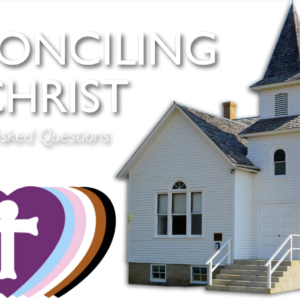All people are welcome in our faith community. Why should we single out lesbian, gay, bisexual, transgender, queer, intersex, and asexual/
aromantic (LGBTQIA+) people and a commitment to anti-racism?
Many LGBTQIA+ people have learned by experience they are not welcome in faith communities, even in those that state, “All are welcome here!” A general statement of welcome is often heard as meaning “everybody but me,” so it can take a special effort to communicate an authentic welcome to LGBTQIA+ people. RIC communities find their journey of discernment extending a welcome to people of all sexual orientations, gender identities, and gender expressions, and commitment to anti-racism opens them up to other people or groups who also need a clear invitation to know the community has truly prepared for them. The ministry of welcome must be intersectional to truly see, name, and care for those God names as beloved.
How does a Lutheran community become an RIC partner?
The community must follow all four of the RIC partner public commitments. They are: 1) Your community explicitly states a welcome to people of “all sexual orientations, gender identities, and gender expressions” or “LGBTQIA+” and names its commitment to racial equity or antiracism in its welcome statement, 2) Open to calling an LGBTQIA+ and Black, Brown, Indigenous, Person of Color (BIPOC) rostered leader, 3)Will allow community space/sanctuary to be used for LGBTQIA+ weddings and blessings, and 4) Will make a meaningful contribution annually to support the national RIC program. A faith communities Welcome Statement to become RIC partner needs to be affirmed at a congregational meeting or a vote by church council or other governing bodies.
When was the RIC program started and why?
Since 1983, the Reconciling in Christ (RIC) Program has been a public way for faith communities to see, name, celebrate, and advocate for people of all sexual orientations, gender identities, and gender expressions in the Lutheran church. The RIC Program is made up of congregations, synods, colleges, seminaries, outdoor ministries, and other Lutheran organizations. Every ministry setting begins this journey from their own unique context and ReconcilingWorks is here to help you create an authentic welcome journey that is customized to your community.
The purpose of the RIC Program is to ensure the welcome, inclusion, celebration, and advocacy for people of all sexual orientations, gender identities, and gender expressions; work for racial equity and commit to anti-racist work and support the national program.

